|
|
|
Sort Order |
|
|
|
Items / Page
|
|
|
|
|
|
|
| Srl | Item |
| 1 |
ID:
131791
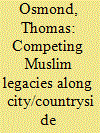

|
|
|
|
|
| Publication |
2014.
|
| Summary/Abstract |
Between the Middle East and Eastern Africa, the city of Harar is often considered as the main historical centre of Islam in Ethiopia and the Horn of Africa. Until recently, the cultural hegemony of the Muslim elites inhabiting Harar was commonly opposed to the almost pagan behaviours of the Oromo - or 'Galla' - farmers and cattle herders living in the wide rural vicinity of the town. The 1995 Constitution provided the different 'ethnolinguistic nationalities' of the new Ethiopian federation with the same institutional recognition. However, the institutionalisation of the two Harari and Oromo 'nationalities' seems to foster the historical duality between the city-dwellers and their close neighbours. This article proposes another political history of Harar and its ambivalent Oromo partners through the local dynamics of the Muslim city/countryside models. It reveals the both competing and complementary orders that have probably bound together the populations of Harar and its rural hinterland for more than five hundred years.
|
|
|
|
|
|
|
|
|
|
|
|
|
|
|
|
| 2 |
ID:
131101
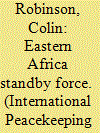

|
|
|
|
|
| Publication |
2014.
|
| Summary/Abstract |
The Eastern Africa Standby Force is one of the five planned regional forces of the African Standby Force (ASF). Since February 2004 work has been underway to raise an Eastern Africa brigade to operational status. However, Eastern African states may prefer to solve their security problems in a unilateral military fashion, rather than through the integrated model of the ASF. Resources, as always in Sub-Saharan Africa, are scarce, operational capability appears to be growing only slowly, and significant training and airlift problems are unsolved. As these problems are common to all five brigades, some thoughts are presented in the conclusion to provide a simplified ASF way forward.
|
|
|
|
|
|
|
|
|
|
|
|
|
|
|
|
| 3 |
ID:
162968
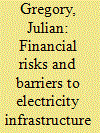

|
|
|
|
|
| Summary/Abstract |
The recent academic literature contains a number of hypotheses, drivers, or explanations to reveal why electricity infrastructure isn’t being developed within sub-Saharan Africa (SSA) in the 21st century. In this paper, we argue that this literature is misdirected, or at least incomplete, in how it approaches risk. We hypothesise that this lack of infrastructure development in the region reflects a dearth of investment due to the existence of excessive negative uncertainties or risks – as investment is a function of uncertainty and reward – but that the recent academic literature appears to not appreciate this. To make this argument, we chose a manageable sample of three African countries, which already had a notable body of academic literature concerning them: Kenya, Mozambique and Tanzania. Focusing on these countries, we then undertook a systematic review of 815 ‘peer reviewed’ papers published on the academic libraries of Scopus and/or the Web of Science on the topic of electricity, infrastructure, and risk over a five-year period to see how this literature evaluated the problem. Drawing from the most relevant 101 studies within that sample, we critically examine the methodological, conceptual, and empirical aspects of this literature.
|
|
|
|
|
|
|
|
|
|
|
|
|
|
|
|
| 4 |
ID:
138687
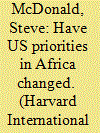

|
|
|
|
|
| Summary/Abstract |
At the end of the first ever US-Africa Leaders Summit on August 7, 2014, President Obama declared that it had been an “extraordinary event,” citing the accomplishments of the summit in terms of trade, investment, and security cooperation. Included in the latter category was a commitment to peacekeeping and the need to address corruption and bad governance in the continent.
|
|
|
|
|
|
|
|
|
|
|
|
|
|
|
|
| 5 |
ID:
137753
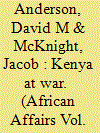

|
|
|
|
|
| Summary/Abstract |
Kenya’s invasion of southern Somalia, which began in October 2011, has turned into an occupation of attrition – while “blowback” from the invasion has consolidated in a series of deadly Al-Shabaab attacks within Kenya. This article reviews the background to the invasion, Operation Linda Nchi, and the prosecution of the war by Kenya’s Defence Forces up to the capture of the city of Kismayo and the contest to control its lucrative port. The second section discusses Al-Shabaab’s response, showing how the movement has reinvented itself to take the struggle into Kenya. We conclude that while the military defeat of Al-Shabaab in southern Somalia seems inevitable, such a victory may become irrelevant to Kenya’s ability to make a political settlement with its Somali and wider Muslim communities at home.
|
|
|
|
|
|
|
|
|
|
|
|
|
|
|
|
| 6 |
ID:
130477


|
|
|
|
|
| Publication |
2014.
|
| Summary/Abstract |
Twenty years ago, in 100 days of slaughter between April and July 1994, an estimated one million Rwandan men, women, and children were killed by their fellow citizens. It was one of the worst genocides in history, and its effects still ripple through Rwanda, central and eastern Africa, and the world at large. It would be obscene to say that such a catastrophe has had even the thinnest silver lining. But it did create a natural -- or unnatural -- experiment, as the country's social, economic, and political institutions were wiped out by the genocide. And in important respects, the reconstructed Rwanda that emerged over the next two decades is a dramatically different country. One major improvement has come in the leadership of Rwandan women, who have made history with their newly vital role in politics and civil society. No longer confined to positions of influence in the home, they have become a force from the smallest village council to the highest echelons of national government. Understanding how and why such a transformation occurred offers not just an opportunity to celebrate their accomplishments. It also provides lessons for other countries struggling to overcome histories of patriarchy and oppression.
|
|
|
|
|
|
|
|
|
|
|
|
|
|
|
|
| 7 |
ID:
045390
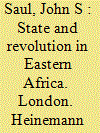

|
|
|
|
|
| Publication |
London, Heinemann Educational Books Ltd, 1979.
|
| Description |
454p.pbk
|
| Standard Number |
0435965417
|
|
|
|
|
|
|
|
|
|
|
|
Copies: C:1/I:0,R:0,Q:0
Circulation
| Accession# | Call# | Current Location | Status | Policy | Location |
| 018752 | 967.604/SAU 018752 | Main | On Shelf | General | |
|
|
|
|
| 8 |
ID:
131793
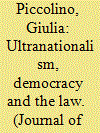

|
|
|
|
|
| Publication |
2014.
|
| Summary/Abstract |
Although much has been written about the ideology of Laurent Gbagbo's Front Populaire Ivoirien in Côte d'Ivoire and its impact on the Ivorian politico-military crisis, little attention has been paid to the ubiquitous role of the law in the discourse and political strategy of the pro-Gbagbo elite. The Ivorian case may provide important insights about the connection between ultranationalist ideology and a legalist, formalist conception of democracy and national sovereignty. The article analyses the circumstances of the emergence of 'legalist nationalism' in Côte d'Ivoire by looking at key episodes of the Ivorian transition between 2002 and 2012. The article discusses the relevance of Pierre Englebert's concept of 'legal command' and the turbulences of democratic transitions in accounting for the prominence of legalism in Ivorian politics. It explores the implications of the Ivorian case for understanding the connection between law and politics in Africa.
|
|
|
|
|
|
|
|
|
|
|
|
|
|
|
|
|
|
|
|
|